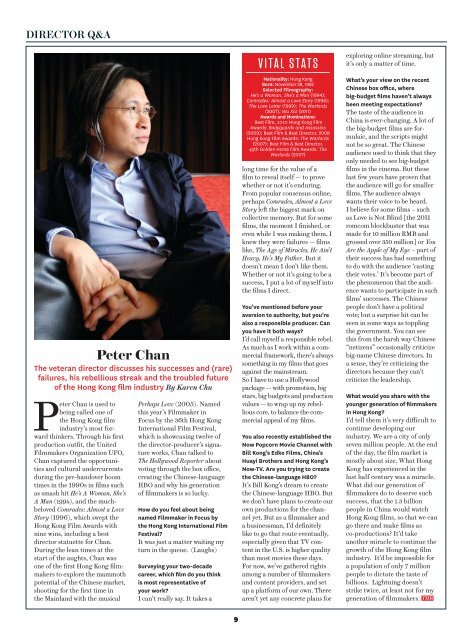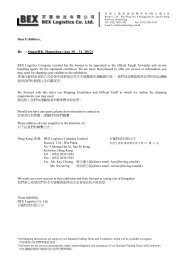HKIFF Heats Up
HKIFF Heats Up
HKIFF Heats Up
You also want an ePaper? Increase the reach of your titles
YUMPU automatically turns print PDFs into web optimized ePapers that Google loves.
Director Q&A<br />
Peter Chan<br />
The veteran director discusses his successes and (rare)<br />
failures, his rebellious streak and the troubled future<br />
of the Hong Kong film industry By Karen Chu<br />
Peter Chan is used to<br />
being called one of<br />
the Hong Kong film<br />
industry's most forward<br />
thinkers. Through his first<br />
production outfit, the United<br />
Filmmakers Organization UFO,<br />
Chan captured the opportunities<br />
and cultural undercurrents<br />
during the pre-handover boom<br />
times in the 1990s in films such<br />
as smash hit He's A Woman, She's<br />
A Man (1994), and the muchbeloved<br />
Comrades: Almost a Love<br />
Story (1996), which swept the<br />
Hong Kong Film Awards with<br />
nine wins, including a best<br />
director statuette for Chan.<br />
During the lean times at the<br />
start of the aughts, Chan was<br />
one of the first Hong Kong filmmakers<br />
to explore the mammoth<br />
potential of the Chinese market,<br />
shooting for the first time in<br />
the Mainland with the musical<br />
Perhaps Love (2005). Named<br />
this year’s Filmmaker in<br />
Focus by the 36th Hong Kong<br />
International Film Festival,<br />
which is showcasing twelve of<br />
the director-producer’s signature<br />
works, Chan talked to<br />
The Hollywood Reporter about<br />
voting through the box office,<br />
creating the Chinese-language<br />
HBO and why his generation<br />
of filmmakers is so lucky.<br />
How do you feel about being<br />
named Filmmaker in Focus by<br />
the Hong Kong International Film<br />
Festival?<br />
It was just a matter waiting my<br />
turn in the queue. (Laughs)<br />
Surveying your two-decade<br />
career, which film do you think<br />
is most representative of<br />
your work?<br />
I can’t really say. It takes a<br />
9<br />
vital stats<br />
Nationality: Hong Kong<br />
Born: November 28, 1962<br />
Selected Filmography:<br />
He’s a Woman, She’s a Man (1994);<br />
Comrades: Almost a Love Story (1996);<br />
The Love Letter (1999); The Warlords<br />
(2007); Wu Xia (2011)<br />
Awards and Nominations:<br />
Best Film, 2010 Hong Kong Film<br />
Awards: Bodyguards and Assassins<br />
(2009); Best Film & Best Director, 2008<br />
Hong Kong Film Awards: The Warlords<br />
(2007); Best Film & Best Director,<br />
45th Golden Horse Film Awards: The<br />
Warlords (2007)<br />
long time for the value of a<br />
film to reveal itself — to prove<br />
whether or not it’s enduring.<br />
From popular consensus online,<br />
perhaps Comrades, Almost a Love<br />
Story left the biggest mark on<br />
collective memory. But for some<br />
films, the moment I finished, or<br />
even while I was making them, I<br />
knew they were failures — films<br />
like, The Age of Miracles, He Ain’t<br />
Heavy, He’s My Father. But it<br />
doesn’t mean I don’t like them.<br />
Whether or not it’s going to be a<br />
success, I put a lot of myself into<br />
the films I direct.<br />
You’ve mentioned before your<br />
aversion to authority, but you’re<br />
also a responsible producer. Can<br />
you have it both ways?<br />
I’d call myself a responsible rebel.<br />
As much as I work within a commercial<br />
framework, there’s always<br />
something in my films that goes<br />
against the mainstream.<br />
So I have to use a Hollywood<br />
package — with promotion, big<br />
stars, big budgets and production<br />
values — to wrap up my rebellious<br />
core, to balance the commercial<br />
appeal of my films.<br />
You also recently established the<br />
Now Popcorn Movie Channel with<br />
Bill Kong’s Edko Films, China’s<br />
Huayi Brothers and Hong Kong’s<br />
Now-TV. Are you trying to create<br />
the Chinese-language HBO?<br />
It’s Bill Kong’s dream to create<br />
the Chinese-language HBO. But<br />
we don’t have plans to create our<br />
own productions for the channel<br />
yet. But as a filmmaker and<br />
a businessman, I’d definitely<br />
like to go that route eventually,<br />
especially given that TV content<br />
in the U.S. is higher quality<br />
than most movies these days.<br />
For now, we’ve gathered rights<br />
among a number of filmmakers<br />
and content providers, and set<br />
up a platform of our own. There<br />
aren’t yet any concrete plans for<br />
exploring online streaming, but<br />
it’s only a matter of time.<br />
What’s your view on the recent<br />
Chinese box office, where<br />
big-budget films haven’t always<br />
been meeting expectations?<br />
The taste of the audience in<br />
China is ever-changing. A lot of<br />
the big-budget films are formulaic,<br />
and the scripts might<br />
not be so great. The Chinese<br />
audience used to think that they<br />
only needed to see big-budget<br />
films in the cinema. But these<br />
last few years have proven that<br />
the audience will go for smaller<br />
films. The audience always<br />
wants their voice to be heard.<br />
I believe for some films – such<br />
as Love is Not Blind [the 2011<br />
romcom blockbuster that was<br />
made for 10 million RMB and<br />
grossed over 350 million] or You<br />
Are the Apple of My Eye – part of<br />
their success has had something<br />
to do with the audience ‘casting<br />
their votes.’ It’s become part of<br />
the phenomenon that the audience<br />
wants to participate in such<br />
films’ successes. The Chinese<br />
people don’t have a political<br />
vote; but a surprise hit can be<br />
seen in some ways as toppling<br />
the government. You can see<br />
this from the harsh way Chinese<br />
“netizens” occasionally criticize<br />
big-name Chinese directors. In<br />
a sense, they’re criticizing the<br />
directors because they can’t<br />
criticize the leadership.<br />
What would you share with the<br />
younger generation of filmmakers<br />
in Hong Kong?<br />
I’d tell them it’s very difficult to<br />
continue developing our<br />
industry. We are a city of only<br />
seven million people. At the end<br />
of the day, the film market is<br />
mostly about size. What Hong<br />
Kong has experienced in the<br />
last half century was a miracle.<br />
What did our generation of<br />
filmmakers do to deserve such<br />
success, that the 1.3 billion<br />
people in China would watch<br />
Hong Kong films, so that we can<br />
go there and make films as<br />
co-productions? It’d take<br />
another miracle to continue the<br />
growth of the Hong Kong film<br />
industry. It’d be impossible for<br />
a population of only 7 million<br />
people to dictate the taste of<br />
billions. Lightning doesn’t<br />
strike twice, at least not for my<br />
generation of filmmakers. thr










